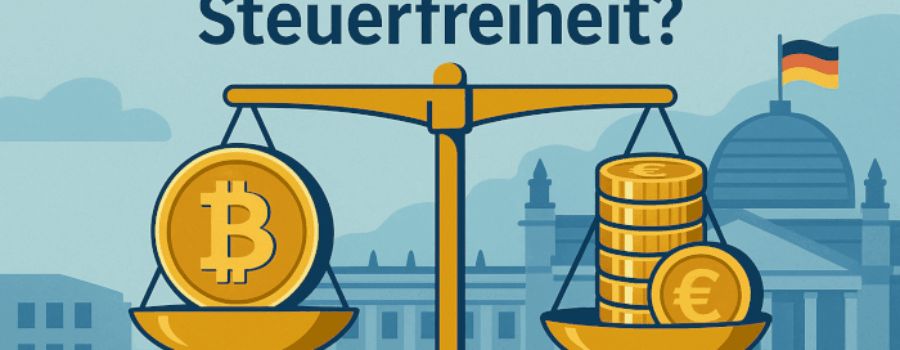A tax law analysis of the SPD proposal to abolish tax exemption
From our Management Board member Matthias Steger
Tax exemption after one year to be abolished
The current rule in Germany is that anyone who holds Bitcoin or other cryptocurrencies for longer than one year can realize the gains made tax-free.
According to the SPD-Seeheimer Kreis, this rule should be abolished.
In future, “capital gains should be taxed uniformly regardless of the holding period”.
This would effectively treat Bitcoin as a permanently taxable asset – regardless of whether it is used as a long-term savings instrument or as a means of payment.
Lack of regulation?
The Seeheimer Kreis is calling for more regulation and also includes tax law across the board. This is inappropriate for the following reasons:
-
SPD Chairman Lars Klingbeil has introduced a bill to implement the DAC-8 Directive. This comprehensively regulates the reporting obligations of exchanges and Crypto Asset Service Providers (CASP). It goes so far that assets may even be frozen if users do not provide the legally required information on time(Crypto Transparency Act).
-
Since 01.01.2025, crypto trading and services may only be provided in the EU if the provider is MiCA-licensed.
-
All exchanges are subject to supervision by BaFin.
-
Exchanges and CASPs must comply with the provisions of the Money Laundering Act and the EU sanctions regulations.
-
Every transaction to a central exchange must contain information about the sender(Transfer of Funds Regulation, ToFR).
As the blockchain is also publicly accessible and transactions are encrypted pseudonymously, but not anonymously, the state already has comprehensive inspection and monitoring options – which are used worldwide to combat crime with software such as Chainalysis.
To put it simply: hardly any other trading commodity is as heavily regulated worldwide as trading in Bitcoin.
The Seeheimer Kreis’ statement is therefore not accurate.
Fairness of taxation
Taxes are levied on the basis of the constitution. This means that not every increase in wealth may be taxed automatically. According to the current system of the Income Tax Act, private increases in wealth should only be taxed in exceptional cases.
Accordingly, Section 23 of the Income Tax Act prohibits the taxation of everyday items (e.g. cars or owner-occupied property).
According to the case law of the Federal Fiscal Court, Bitcoin is considered an “other asset” within the meaning of Section 23 EStG – just like non-owner-occupied real estate, foreign currencies, precious metals or commodities.
The Seeheimer Kreis is therefore working on the wrong basis, as these “other assets” are treated equally under current law.
Only the SPD proposal would lead to unfair taxation, as the same would no longer be taxed equally.
Equating Bitcoin with shares
The Seeheimer Kreis seems to have forgotten why shares and shares in corporations were gradually removed from the scope of application of Section 23 EStG and subjected to the flat-rate withholding tax.
The introduction of taxation of shares in corporations in Section 17 EStG was necessary because otherwise profit distributions would have been taxed, but not the sale of “undistributed profits”.
The situation is similar with the inclusion of share profits in Section 20 EStG, provided there is no significant shareholding (Section 17 EStG). Here too, dividends and capital gains should be treated uniformly.
However, this is not the case with Bitcoin, as there are no profit distributions, only trading profits.
Bitcoin is therefore most comparable to gold.
Fairness through taxation like real estate
Bitcoin capital gains are only taxed in the same way as real estate if the speculation period has not expired.
The Seeheimer Kreis seems to have lost sight of the applicable law at this point.
Fairness through taxation like shares
Taxation based on the flat-rate withholding tax was already demanded by the SPD during the Bundestag election campaign, even though it was ultimately not included in the election manifesto.
However, the introduction of withholding tax on crypto profits would favor short-term speculation over long-term investment.
Under the current legal situation, an investor checks before selling whether up to 48% tax is due on the profit and, if necessary, postpones taking profits until the speculation period has expired.
Speculators, on the other hand, may achieve high profits through frequent turnover – but have to pay tax on these at up to 48%. This has a deterrent effect.
If the tax rate were lowered to 25 %, speculators’ returns would increase by almost 50 %. The legislator would thus create massive incentives to “gamble”.
Long-term investors, on the other hand, would have to generate 25% higher returns than today, which would tempt them to take profits earlier.
Risk of loss is ignored
The Seeheimer Kreis only looks at profits, but ignores the risk of losses.
If the proposal to equate cryptocurrencies with shares were implemented, losses from crypto sales would have to be offset against income from capital investments. Insolvencies such as FTX, Genesis, BlockFi or hacker attacks could then lead to a tax contribution by the general public.
Losses would thus be socialized – the taxpayer would indirectly participate with 25%.
Bitcoin is not the same as crypto
Finally, the Bitcoin Bundesverband points out that Bitcoin is fundamentally different from other so-called crypto-assets.
Bitcoin is not a speculative token issued by a company or centrally controlled, but a decentralized, open money system that works without intermediaries.
While many crypto projects are geared towards short-term profits and tokenization, Bitcoin stands for long-term value preservation and financial independence.
A blanket equal treatment of all digital assets does not do justice to this difference and jeopardizes the acceptance and use of Bitcoin as a digital, borderless means of payment.
Bureaucratic costs and effort
Abolishing the holding period would have far-reaching consequences:
Every everyday Bitcoin payment – for a coffee, a train ticket or a donation, for example – would become a tax-relevant event.
Users would have to document the acquisition date and market value of every transaction in order to calculate potential gains or losses.
This makes everyday payments with Bitcoin practically impossible and thwarts the idea of a decentralized, user-friendly payment alternative.
The financial administration would also have to devote considerably more resources to checking such transactions.
Location disadvantage for Germany
Such a tax change would also be economically problematic.
While other countries in Europe – such as Austria or Portugal – are creating more crypto- and innovation-friendly framework conditions, Germany would lose further attractiveness with an additional tax burden.
Companies, developers and start-ups working on Bitcoin or blockchain technologies could move away – a clear disadvantage in the competition between European locations.
Digital euro: not progress, but more control
The SPD presents the introduction of a digital euro as a step towards a secure and modern payment system.
From the perspective of the Bitcoin Bundesverband, however, the introduction of a state-controlled, centralized digital money does not make sense.
A digital euro would not solve any of the fundamental problems of the existing financial system – on the contrary: it could lead to greater surveillance and control of citizens.
The fact that the SPD simultaneously promotes such a state system, but wants to effectively prevent decentralized digital cash such as Bitcoin through tax hurdles, shows a worrying imbalance in the political debate.
In contrast to the digital euro, Bitcoin offers genuine financial sovereignty: everyone can dispose of their own money without having to rely on banks or state systems.
Instead of control and surveillance, we need trust in open, verifiable systems.
Conclusion: not progress, but a step backwards
The Bitcoin Bundesverband sees the Seeheimer Kreis’ proposals as a step backwards in the direction of digital personal responsibility and innovation.
Taxing even the smallest transaction would make the everyday use of Bitcoin virtually impossible.
Instead of putting the brakes on innovation, Germany should create framework conditions that promote financial literacy, technological openness and sovereignty – and clearly take into account the differences between Bitcoin and crypto-assets.




